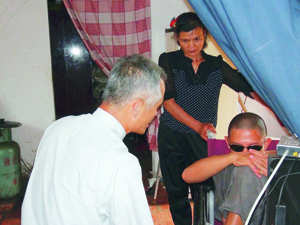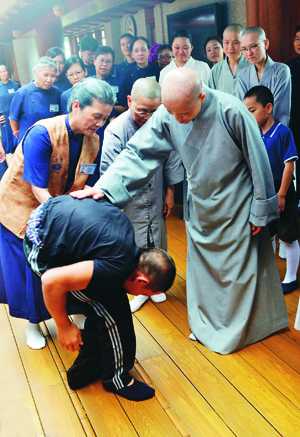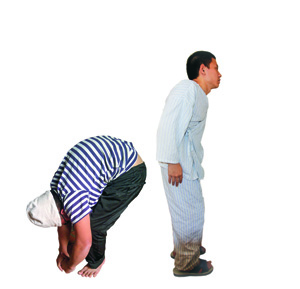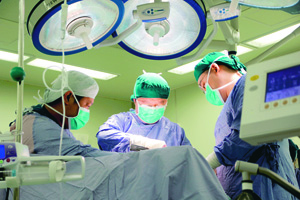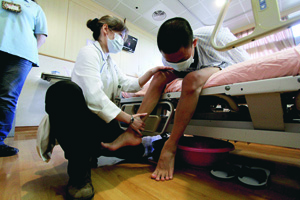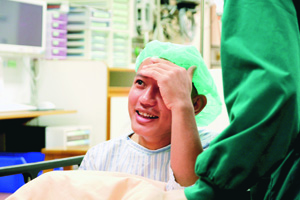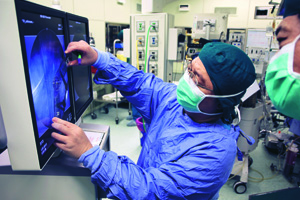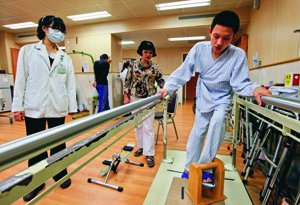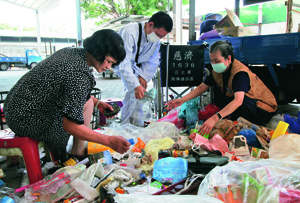

| Walking Tall | ||||||||||||||||||||
| By Huang Xiu-hua Translated by Tang Yau-yang | ||||||||||||||||||||
For more than half of his 31 years, Yang Xiaodong was quite literally folded in half, fixed in a posture unthinkable for ordinary people. He could not lie flat or stand straight; his chin was nearly pressed to his knees. He was so ashamed of his unusual appearance that he avoided any human contact. He shut the world out and lived in isolation at home. His biggest wish was something most people take for granted every day: to be able to lie flat in bed, with his head, shoulders, buttocks, and heels resting on his bed at the same time. Five operations later, he walked with his head held as high as his spirits, out of the hospital into a world that seemed brighter than ever before.
To imagine what Yang Xiaodong (楊曉東), 31, looked like just a few months ago, think of a taco shell or an apple turnover. Such comparisons are hard to believe, but they are true: He was literally folded in half at the waist, bent forward more than 200 degrees. His chin nearly touched his knees. Xiaodong and his family lived in Xiamen, Fujian Province, southeastern China. For 17 years, he refused to see other people, not even his friends. He hid himself in his home, in his room; he only allowed his family to see him. When he shut the door of his room, he also shut his heart in. Although his chin was near his knees, his eyes were always alert. He was constantly on the lookout for other people approaching him. If people got too close, he would bury his head deeper between his knees. He preferred to pass his days like this, closed off in his self-imposed cocoon, than let others see the sorry shape that he was in on the outside—and the fragile state that he was in on the inside.
All this hurt his mother, Zhu Jinchai (朱金釵), more than anybody else. She had supported her whole family ever since her husband’s business failed. Then he died, leaving her alone to raise their children. She worked and worked just to keep up with expenses. Seeing Xiaodong cut himself off from others only added to the heaviness of her heart. She was tired. She saw no hope. That only began to change when Tzu Chi volunteers knocked on their door in May 2013. Light and hope finally peeked into the house. A long decline In 1994, Xiaodong was an active sixth grader. He was 12 years old, and his brother three years older. One day when the boys were fishing at a pond, Xiaodong cut his foot on a piece of broken glass. His mother hurried him to a “barefoot doctor” (usually a local farmer who receives basic medical training), and he stopped the bleeding. Soon after, Xiaodong began feeling pain in his knees. They went back to the doctor, but he told them that the pain had nothing to do with the cut. He said that it was nerve pain and diagnosed the boy with rheumatoid arthritis. The Yangs had never heard of that condition before. Xiaodong’s parents began taking him to one place after another for treatment—based on well-meaning but perhaps ill-advised recommendations from neighbors. They first went to Quanzhou, three hours by car from their home. Several hundred renminbi provided the family with 20 packets of herbal medicine. Jinchai simmered the herbs every day and administered the concoction to Xiaodong. The prescription worked at first, but then it gradually lost efficacy. Xiaodong’s symptoms worsened with time. The family later moved to a rented apartment in Maxiang Township, two hours’ drive away, so that Xiaodong’s father could more easily take care of his construction supply business. Xiaodong attended a junior high school about 1.5 miles from their apartment. He rode a bike to and from school every day. It took him just 20 minutes for the round trip. The ride itself was not too much of a problem, but he needed to carry the bike down six flights of stairs from their apartment in the morning and back up the six flights in the afternoon. That was quite a challenge for his weakening knees. Though his parents continued to take him to doctors, his condition deteriorated. Neither Chinese herbal medicine nor Western medicine did him much good. His legs and sciatic nerves hurt frequently, and his temper flared when his nerves flared. Bad weather intensified his pain. Even the slightest touch on a sensitive sore spot would send him jumping from a chair. As his disease progressed, he began having trouble standing erect. By the time he entered eighth grade, he had resorted to crawling to get around. He attended school intermittently during this time, and when he did go, his schoolmates ridiculed him for his unusual-looking posture. Though the schoolmates might have meant no real harm, their behavior caused great pain for Xiaodong. After all, he was just a young teen, a stage in life where peer acceptance is more important than anything else. He ended up taking a prolonged leave of absence from school to avoid being seen and humiliated. Spared from schoolwork, the young boy started shutting himself up tightly inside his room. He even refused to let his best friend from school into his room when he came to see him. After the friend had left, he told his mother, “If anyone comes to see me, just tell them that I’ve died.” “Many people have lost their legs, but they still bravely go out into the world,” his parents said to him. “How about we buy you a wheelchair to help you move around?” But he refused. They tried time and again to persuade him, but their efforts were to no avail. He continued to shut others out of his isolated world. In the end, he allowed only his family in to see him.
More setbacks Locked in his room, Xiaodong had all the time in the world to kill. A computer that his brother had set up for him became his constant companion. His face near his knees, he would sit in a chair and play games or mahjong with others online. Sometimes he made online purchases for his family. In this way he passed day after day, week after week. Months grew to years. He refused to leave his room for meals, or even to use the bathroom. His mother took his meals into his room and took out his waste in a bucket every day. All the while, his deformity worsened. His body ached and curled more and more severely. Xiaodong was not the only one in the family going downhill. His father’s business greatly declined as well, so his mother had to become the main breadwinner of the house. She worked in a hospital as a cleaning lady. The business setbacks and the fact that his son had been sick for so long with little hope of recovery dealt a severe blow to the senior Yang. He became mentally unstable and took to wandering about. Many times he was found in some obscure small village, and once he ended up in downtown Xiamen, very far from home. He had been missing for a while when the police notified Jinchai of his whereabouts. She hurried over to claim him. Her heart almost broke when she saw that her husband was wearing only underwear—it was near Chinese New Year, in the middle of winter. She was also shocked at how skinny he had become. She took him home and cared for him, but he passed away in less than a year, in 2008. Jinchai and her sons moved back to their original village. Their old family house had collapsed, so they lived in a deserted elementary school. With her husband gone, Jinchai told herself that she had to be strong. But six months later, her older son was struck with misfortune, too. He was hit two separate times as he was ferrying paying customers to their destinations on his motorcycle. He suffered a broken left leg, but the family had no money to treat it. The wound ulcerated, and the doctor declared that the leg had to be amputated. After a newspaper in Xiamen reported the family’s seemingly endless hard luck, a kind-hearted benefactor visited Xiaodong’s brother in the hospital and paid for four operations that saved the leg. Though it was kept whole, it didn’t regain enough strength for him to return to work. Jinchai had no choice but to continue to work hard and provide for the family. She worked at an electronics factory as a cleaning lady. After work she tended a vegetable garden for food. This was in addition to caring for Xiaodong and doing the chores at home. She was like a top spinning non-stop for the family. In late November 2012, she herself was hurt in a traffic accident. She was taking recyclables on her motor scooter to sell when a car broadsided her. Her left leg was badly injured. She underwent surgery, but without waiting for the wound to heal, she discharged herself against medical advice from the hospital to save money. Then she limped back to work. After all, her family needed the money.
Light beckoning The family seemed to suffer one setback after another. Its downward spiral only stopped at the end of 2012 when Pan Shijian (潘世建), deputy chair of the National Committee of the Chinese People’s Political Consultative Conference of Xiamen, helped qualify the Yang family as a low-income household. This entitled the family to receive the national subsidy for maintaining minimal living standards. Pan also referred the family to Tzu Chi in the hope that its volunteers might be able to help convince Xiaodong to undergo treatment. Volunteers visited the Yang family in January 2013 and saw the severity of Xiaodong’s deformity. They also saw that he was so uncomfortable in the presence of other people that he would just bury his head between his knees so that nobody could see his face. The volunteers thought of a similarly afflicted patient who had been cured at Hualien Tzu Chi Hospital. The volunteers took it upon themselves to help Xiaodong. They returned to the Yangs’ place a few days later and gave Xiaodong a hat and a pair of sunglasses. They hoped that these items might serve as a psychological shield to help him feel more at ease about facing strangers. The volunteers then took the young man to a hospital in Xiamen for a checkup. That was the first time that Xiaodong had been out of his home in many years. He was quiet as usual but otherwise cooperative. Apparently, he was comfortable with the uniformed volunteers. At the hospital, however, they ran into a rare technical issue. The technicians could not unbend Xiaodong’s body to take useful X-ray images. As a result, the doctors were unable to get a clear read of the films. The hospital visits therefore did not lead to any treatment plans for him. The volunteers did not give up though. On their third visit to Xiaodong’s home, they gave the family a television and set up a satellite dish to enable them to watch programs aired by Da Ai TV, a station run by the Tzu Chi Foundation. They hoped the wholesome messages conveyed by the programs would help open up Xiaodong’s heart. They also stayed in close touch with people at the foundation headquarters and Tzu Chi Hospital in Hualien, Taiwan, to explore the possibility of having Xiaodong treated there. They took photographs and videos of Xiaodong and sent them to Taiwan to help with the evaluation.
The Hualien team The orthopedic team at Hualien Tzu Chi Hospital was headed by Dr. Chen Ing-ho (陳英和), an attending physician and an honorary superintendent of the hospital. In the previous 20 years, his team had operated on more than 200 patients suffering from ankylosing spondylitis, the disease that afflicted Xiaodong. Ankylosing spondylitis is an inflammatory disease that can cause fusion of vertebrae in the spine, making the spine less flexible and leading to a hunched-forward posture. After much coordination and consultation with the volunteers in Xiamen, the orthopedic team decided to accept Xiaodong as a patient. They were certain they could improve his condition. On May 23, 2013, accompanied by Tzu Chi volunteers from Xiamen, Xiaodong and his mother flew to Hualien. He checked into Hualien Tzu Chi Hospital, and the very next day he started to undergo a battery of tests. The X-ray problem that had occurred at the Xiamen hospital surfaced at the Hualien hospital as well. To solve the problem, technicians took X-rays of him in various positions, including sitting or lying at all angles, so as to procure all the possible images that the doctors would need. The tests also included a CT scan; it took the technicians a lot of effort to finally fit his body into the machine. That evening Dr. Chen rushed back to Hualien from Taipei, where he had just finished an operation. He visited Xiaodong in his patient room and went over the treatment plan with him and his mother. “If both of my hip joints are operated on, will I then be able to lie flat?” Xiaodong asked Dr. Chen. That question revealed a wish he had had for years—to be able to lie flat in bed. “Are you scared of surgery?” Dr. Chen asked him. The young man firmly replied, “No!” The doctor pointed out that Xiaodong’s inflammation had occurred while he was still growing, which had led to his particularly severe deformity. He ranked the young man’s condition among one of the most severe ankylosing spondylitis cases that he had ever treated, but he was nevertheless quite confident that surgery and rehabilitation would improve his condition. On the third day after their arrival in Hualien, Xiaodong and Jinchai went to see Master Cheng Yen at the Jing Si Abode. The Master said to Xiaodong, “Walk home with your head held up high.” He heard her gentle encouragement—indeed, he heard it loud and clear. “I want to show the Master how I walk,” he said. He slowly wiggled himself out of his wheelchair and walked with his unique and laborious steps. It was a moving, tear-inducing sight. No doubt Xiaodong had the desire to straighten up, but he had some hard work to do before he could reach his goal.
The treatment Five operations ensued in the following two and a half months, between May 28 and August 13, 2013. The first two were on his hips and the remaining three on his spine. Xiaodong showed improvement after each surgery. His mother was delighted, and he became more confident of his prognosis and of himself. “We saw a difference after the first operation, and the improvement was even more obvious after the second one,” Jinchai said of her son’s progress. “After the fifth procedure... wow, he was able to sit upright! Dr. Chen is just awesome!” Jinchai couldn’t thank Chen and his team enough. As can be imagined, Xiaodong was also delighted and grateful, but being shy, he kept his appreciation to himself. He was still too self-conscious to interact naturally with others. When Dr. Chen went to see him, he would still grab his hat and cover his face. Jinchai reminded him of the proper etiquette to show in the presence of the medical team, particularly Dr. Chen, who had been doing all he could to help him. When moral persuasion did not seem particularly effective, she said to her son bluntly, “He has already seen the whole of you when you were under his scalpel. What’s there to hide or be shy about now?” That was entirely true, and the admonition hit the nail right on the head. After the third operation, Xiaodong was able to face Chen eye to eye. Gradually, he was shedding his timid, withdrawn self. However, the isolation from the outside world that he had endured for 17 years would require more effort to overcome than a simple reminder from his mother. His self-imposed segregation had left him lacking interpersonal and social skills. He often behaved more like a moody child than a 31-year-old adult. It was important for people who were helping him to keep this in mind so that they could rationalize his seemingly odd and sometimes downright rude behaviors. With such understanding, they were able to put up with him better. Xiaodong’s mother had been his primary caregiver, so she took the brunt of his bad temper most of the time while at the Tzu Chi hospital. But she was rendered temporarily unable to care for her son after she herself underwent surgery in June. The steel plate that doctors had inserted into her left foot after her traffic accident in November 2012 had broken, leading to an ulcerating wound. Dr. Chen operated on her to fix the problem. Because both mother and son were bedridden, Tzu Chi volunteers from Xiamen paid a professional caregiver to tend to Xiaodong. However, his bad temper drove that person away. A Tzu Chi volunteer from central Taiwan then volunteered to take care of him, but Xiaodong treated him badly, too. It was particularly hard for him to hold in his temper in a physical therapy session, as the pain, such as when he was being stretched by a physical therapist, could easily cause him to flare up. When he behaved particularly badly, seasoned volunteers such as Yan Hui-mei (顏惠美) or Su Zu (蘇足) would teach him to sing Tzu Chi songs or ask him to copy aphorisms by Master Cheng Yen to calm him down. If all their methods failed to do the trick, they would tell him straight, “If you keep behaving like this, we’re going to tell the Master.” That always worked. “He respects the Master a lot,” Jinchai said of her son. “He wants to be a good disciple of hers.” Aside from accompanying her son during their stay in Hualien, Jinchai also volunteered for Tzu Chi. Less than a month after her operation, she began going with volunteer Huang Yue-ying (黃月英) to a recycling station to help. She volunteered at the Jing Si Abode as well, helping in the kitchen or doing cleaning work. She also attended a painting class for recycling volunteers. Xiaodong was busy on his own. After the fifth operation, when he was not in rehab sessions, he would visit almost every corner of the hospital campus, taking photos with a camera that Pan Guo-yang (潘國揚), the hospital social services director, had loaned him. He then posted the photos on the Web to share with his Internet friends in China. The Tzu Chi volunteers and the medical team did their best to care for Xiaodong during his stay in Taiwan. Such warmth went a long way toward opening him up, and in the process he was able to wean himself from his security sunglasses and hat. He learned to face the world the way he was, even with confidence and composure. His transformation greatly surprised the volunteers who came from Xiamen to escort him and his mother home at the end of October 2013. “He’s opened up, not just physically, but also mentally,” said Chen Zhou-ming (陳州明), one of the volunteers. “I’d never seen him smile before, but now he smiles all the time. He’s a different person.” Volunteer Tong Zhandong (佟占東) echoed Chen’s sentiments. He said that Xiaodong was indeed a changed man—he had always bowed his head low and uttered nothing in response when others talked to him, but he now responded to every query. What a difference a few months had made, Tong marveled. He figured that the medical and the volunteer teams at the Tzu Chi hospital must have treated him very nicely—as loving parents would their own son.
On October 29, 2013, the day before returning to Xiamen, Xiaodong and Jinchai went to the Abode to say farewell to Master Cheng Yen. When the Master saw the young man walking upright toward her with the help of a walking stick in each hand, she asked if he could walk unaided. He put the sticks away and walked forward to show her. People all around cheered. The Master reminded him that the medical team had worked extremely hard to help him, so he must not let them down. He must be diligent in rehabilitation, learn to keep an open mind, and never close himself up again. She also reminded the volunteers from Xiamen that they should love him but never spoil him, and that they should expose him to good influences and help him develop a sound mind.
Upon hearing these words, Xiaodong said abruptly, “I want to attend the Department of English Language and Literature at Tzu Chi University.” The Master smiled as she replied, “If you have the intention, I’m definitely behind you. But first things first: Finish junior and senior high school, and keep your grades up.” The next day, staff members from the Xiamen Charity Federation and Tzu Chi volunteers accompanied Xiaodong and Jinchai on their way home. When he emerged from the airport security checkpoint, the waiting volunteers shouted, “Welcome home, Xiaodong!” Xiaodong had promised Xiamen volunteers before he left for Taiwan that he would come back walking. And walk he did. Aside from the help of walking sticks, he was unassisted; nobody was holding him up. He did not have his sunglasses on either—he was no longer ashamed of letting others see him. From there he went to his new home, which had been built by the Xiamen Charity Federation for his family. An aunt who lived nearby saw him. Not believing her eyes, she touched the cheek of the man standing before her and said, “You’ve become handsome; you’re ripe to be a bridegroom.” Everybody laughed. His sister-in-law added, “His face used to scare me, but no more. It’s very good-looking now.” In addition to such warm and welcoming family members, Tzu Chi volunteers now stand ready to give Xiaodong the support that he will need as he continues to rehabilitate and return to a normal life. |
















|


